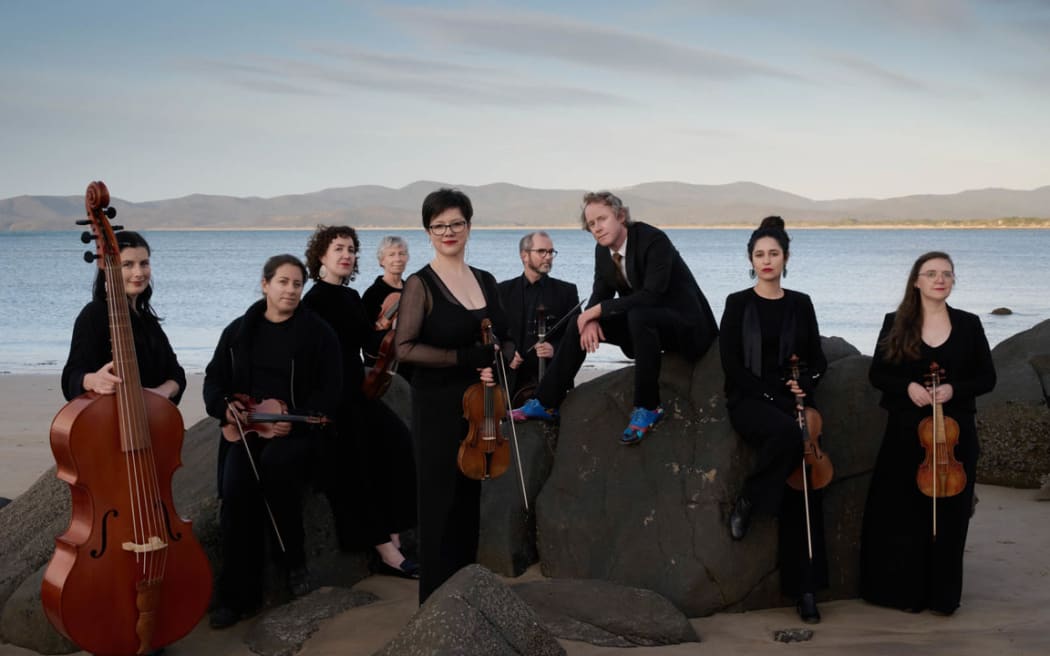Australian early instrument ensemble Van Diemen's Band presents a programme of largely 17th-century music by composers whose lives were affected by changing borders in Europe at the time, but whose music transcended those borders.

Van Diemen's Band Photo: Albert Comper, ex Van Diemen's Band website
Based in Tasmania and founded in 2016 by violinist Julia Fredersdorff, Van Diemen's Band can vary in size from an intimate chamber group to a larger mid-eighteenth-century orchestra. Their website tells us that they explore the creativity and freedom of expression in music of the baroque while deferring to historical sources on style and instrumentation.
This programme they are playing on their New Zealand tour is called ‘Borderlands’ and they explore music by a variety of European composers who worked as borders shifted beneath their feet.
The musicians in this performance: Julia Fredersdorff (violin, director), Simone Slattery (violin, recorder), Katie Yap (viola), Laura Vaughan (viola da gamba), Anton Baba (viola da gamba, cello), Donald Nicolson (harpsichord).
Christopher Lawrence has written an excellent essay for the programme booklet and he begins:
“The world has changed dramatically in the months between Van Diemen’s Band’s devising of this programme and the performance you’re about to hear, freighting the term ‘borderlands’ with renewed and disturbing resonance. But hearing this Baroque music at a time of present-day geopolitical stress is to have a kinship with the circumstances of its composers, many of whom experienced first-hand the tensions of 17th-century Europe; in particular, within the German states of the Holy Roman Empire riven by the Thirty Years War that ended in 1648. For Van Diemen’s Band artistic director Julia Fredersdorff, the German music of this post-war period written by the generations preceding Johan Sebastian Bach is an endlessly fertile and innovative legacy.”
Alongside the baroque music, the programme also contains two works from our current century written for the baroque instruments – by María Huld Markan Sigfúsdóttir from Iceland and New Zealander Donald Nicolson.
BECKER: Sonata No 5, from Musicalische Frühlings-Früchte
Dietrich Becker was a North German composer of the 17th Century. He dedicated his collection, Musicalische Frühlings-Früchte ("Musical Spring Fruits") to his native Hamburg in gratitude for the granting of a full-time job after years as a freelancer.
This F major sonata displays Becker's acquaintance with Italian and French musical styles.
SCHEIDT, BECKER, DE SAINT-COLOMBE, ERLEBACH: Borderlands Suite
Julia Fredersdorff has collected together this suite themed on war especially for this concert:
Battaglia Galliarda by Samuel Scheidt
Paduan by Dietrich Becker
“Les pleurs” by Jean de Sainte-Colombe
Courant in 4 parts by Scheidt
Chaconne from Philipp Erlebach’s Overture No 2.
ALBINONI: Sinfonia in C Op 2 No 3
Venetian born Tomaso Albinoni was somewhat of a bridge between the five-part string writing of the 17th century and the later more overt virtuosity of his near-contemporaries Vivaldi and Locatelli.
The fast movements of this Sinfonia display a deft contrapuntal hand and the in slow movements, we can hear the singing melodist. Albinoni was above all an opera composer with some 80 stage works.
MUFFAT: Sonata No 1 in D, from Armonico Tributo
As Christopher Lawrence writes in his programme notes, Muffat’s “life and work represent a traversal of borders in every sense. Descended from Scots, born French, part-educated in Paris and Italy, driven by the threat of war to Vienna, Prague, Salzburg, and Passau, he ultimately considered himself a German.”
This sonata was written under the inspiration of Arcangelo Corelli. It’s a Concerto grosso – the form that Corelli pioneered.
María Huld Markan SIGFÚSDÓTTIR: Clockworking
Icelandic composer María Huld Markan Sigfúsdóttir is most well-known as a member of the indie band amiina.
Clockworking is a scored for Baroque string trio and pre-recorded tape.
ANON: Sonata jucunda, from Kromêříž Collection
A bizarre anonymous work found in the Kromêříž Collection in the Czech Republic. It has been attributed without confirmation to Heinrich Biber.
Donald NICOLSON: Spirals
A work commissioned especially for this concert. Nicolson uses a ground bass line as in a Chaconne or Passacaglia as the basis for an exploration of the infinite or the inevitable.
He weaves in the melody of a Slavonic Orthodox lament "My sinful soul/Why don't you weep?".
The constant rotation of the passacaglia symbolises the circularity of human travail, history repeating.
BIBER: The Nightwatch
Performed as an encore, this song is also contained in the Kromêříž Collection. The vocal line is played by Laura Vaughan on viola da gamba in this performance.
Recorded by RNZ Concert in Auckland Concert Chamber, 13 September 2022
Producer: Tim Dodd
Engineer: Rangi Powick

